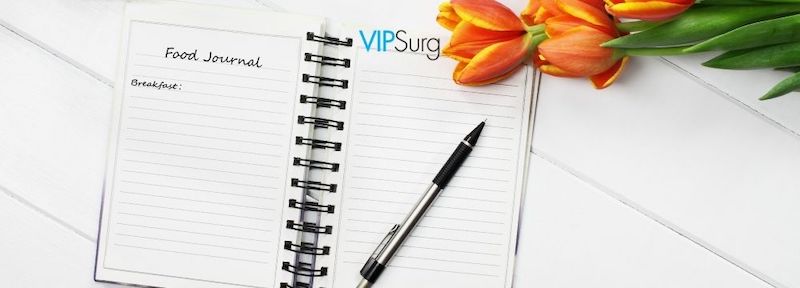How Journaling Helps Bariatric Patients Be Successful
When embarking on the journey of weight loss surgery, the plethora of information can seem overwhelming. Monitoring fluid intake, exercise, food tolerance, etc. is a lot! Keeping a weight loss journal is one of the best ways to ensure that we stay on track for the long run!

One of the key concepts of maintaining long-term weight loss is mindful eating. In our fast-paced lives, it’s all too easy to snack on something in the car, while we’re working, or in front of the TV. Although at times it may be unavoidable, eating like this should be the exception, not the rule. Journaling everything that we eat automatically makes us more mindful about what we are consuming during the day. It can help us be more cognizant of the choices we are making and the effects those choices have on our success.
Journaling can also help us identify trends. By keeping detailed records, it can help us zero in on foods or exercises that our bodies aren’t tolerating well. Some of us may have gluten sensitivities while others may be lactose intolerant, for example. It can also help us see if there are times during the week, month or year that are more challenging. For example, monthly hormone shifts can greatly affect our hunger levels. Holidays can also be an extra challenging time. By being aware of these patterns, we can be more proactive in developing a game plan to stay successful.
Finally, when you hit one of those inevitable plateaus after bariatric surgery, you may want to look back and see what worked and what didn’t in your diet and exercise progression. Using your journal, you can see any trends that may be contributing to a lack of weight loss. It’s also a great way to get back on the motivation train.
So, what should be included in a weight loss journal? At the most basic level, it should include daily food and fluid intake and exercise. This will also depend on where you are in your journey. Immediately post-op, the most important thing to measure will be fluid intake. But, as you progress through different dietary stages, you will need to keep track of more things. Depending on your personal plan and goals, you may want to go deeper. You can include things like calories, net carbohydrates, protein, daily weight, emotions, stressors, etc. The most important thing is that you make it useful for you. This tool is only beneficial if you are regularly recording data that is meaningful to your journey.
How do we get started? There is a multitude of ways to keep a weight loss journal. There are free and paid websites and apps that make it very easy! Try a few out to see if one is a better fit for you. Or, if you prefer, you can simply use a paper planner to keep track of everything. Again, choose the strategy that is easy and, dare we say, fun, for you. That way, you’ll stick with it!



